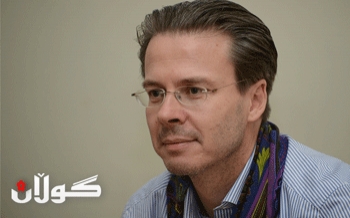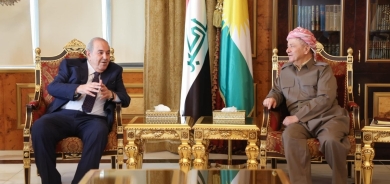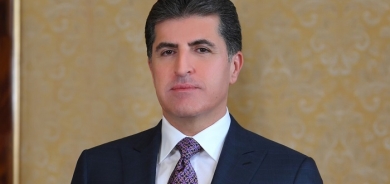Tobias Schumacher: Kurdish state-building has become a reality
December 27, 2015
Exclusive Interviews

Schumacher: For decades, if not to say centuries, the Middle East and North Africa (MENA) have been exposed to both external interference and regional rivalries. In fact, the current territorial map of the MENA is a result of the geopolitical competition of powerful external actors, the number of which has increased considerably since the end of the Cold War. While up until 1989/1990 external engagement, and to some extent regional powers’ quest for regional hegemony, were mainly a function of the East-West conflict, the fall of the Berlin wall and the subsequent changes in the global order motivated numerous external actors to increase their presence in parts of the region. This goes hand in hand with a recent US pivot to Asia and a generally more isolationist US foreign policy under president Obama and a growing self-assertiveness of Gulf states, such as Saudi Arabia, Qatar, Kuwait and to a lesser extent the UAE. Against the backdrop of Russia’s recent attempts to expand its military presence as well as its diplomatic, political and economic relations in many parts of the Mashreq and the Maghreb, and taking into account the recently concluded 5+1 nuclear deal with Iran allowing the latter to be re-legitimated, it is obvious that the geopolitical complexity in the region is advancing even further. This has been having negative repercussions for joint problem-solving and has created a void that non-state actors such as ISIS/Da’esh and their local affiliates are trying to fill. The recently held Vienna talks on Syria, bringing together rather unusual bedfellows such as, among others, Iran, Saudi Arabia and Turkey might be interpreted by some as the first signs of a new multilateral alliance in the fight against terror and a means to advance conflict resolution. However, such views are rather premature as the building of any anti-terror coalition will not be able to alter the rather diverging regional interests of all actors involved and tackle the artificial, though rather manifest Shia-Sunni divide. In other words: while the most relevant regional and extra-regional actors have all subscribed to the premises of the UN Charta and international norms, such as the Responsibility to Protect (R2P), they have been interpreting them in rather different ways that are exclusively destined to benefit their own geostrategic interests.
Gulan: Right now the fight against Islamic State entered a new phase; this organization has proved that it constitutes a serious global threat that requires a global response. So, how the strategy for weakening and destroying the Islamic state should be developed in order to be up to the task?
Schumacher: In fact, the very existence of actors such as ISIS/Da’esh is the result of external intervention in the MENA and the failure of stubbornly autocratic rulers in the region to commit themselves to a true social contract destined to provide their citizens with social services, education, welfare and thus labour market development. Instead, autocratic regimes, before, during and after what was called the Arab Spring in 2011, have been focusing almost exclusively on consolidating their power and their access to state resources at the expense of true public political participation and socio-economic development. In turn, engaging in true political liberalization and socio-economic modernization, in conjunction with offering citizens access to modern and secular educational systems, is key in regional and external actors’ fight against radicalisation and radicalism as such. As long as autocratic rule, repression and social exclusion continue to characterize the MENA, radicalization will persist. However, adopting a new social contract alone is not sufficient. Mechanisms need to be established, and pressure exerted, in order to prevent and cut immediately the financing of ISIS/Da’esh and other radical, terrorist movements. This means that regional actors such as Saudi Arabia, Qatar and Kuwait need to assume their share of responsibility and made become aware that their rather opaque practices and obscure links with radical non-state actors in the region are detrimental to their own stability. Also, as long as western powers keep on supporting autocratic regimes – recent calls by western leaders to finally re-engage with Assad are a cynical example in this regard – they continue undermining their own legitimacy and rule themselves out as credible supporters of democracy, good governance and the rule of law.
Gulan: There is consensus among scholars that ISIS the manifestation of deeper structural problems in this region, and the peoples of regions are stuck between a deeply dysfunctional states and sectarian violent and radical religious movements, what are the possibilities of emerging different types and colors of radical religious trends in the future in the case of failure of addressing the root causes of the problems?
Schumacher: Any ideology, however perverted, has the potential to benefit from the persistence of autocratic rule, corruption, humiliation and socio-economic exclusion. Life perspectives and future prospects are a direct function of the respective political, economic and social milieus individuals grow into. Unless these are conducive to personal development and growth, they are almost invariably breeding grounds for disillusionment and disenchantment with politics, then for hatred, and eventually for radicalisation and violence in the name of whatever ideology that seems to offer meaning and belonging. In this regard, it is no surprise that the MENA region, boasting the largest number of non-democratic regimes, does also boast the largest number of ultra-radical, allegedly religiously inspired anti-system movements, and the number and diversity of such groups is bound to rise.
Gulan: Some propose that in order to persuade the Sunnis to rise against ISIS and the Sunni states to actively engage in combating ISIS, they have to have a greater stake of the outcome of the fight, meaning that a Sunni state has to be crated for Sunnis in the ISIS controlled territories in both Iraq and Syria, to what extent this is a realistic, and viable option?
Schumacher: The international community has made it repeatedly clear that any redrawing of the territorial boundaries in the region is currently not in the cards. However, this defies the ongoing dynamic on the ground, in particular in Syria and Iraq, where the central authorities already do no longer enjoy the monopoly on the use of force. While ISIS/Da’esh and other radical elements have managed to impose their rule over certain parts of Syria and Iraq, and while Kurdish state-building has become a reality in northern Iraq, the creation of a purely Sunni state – regardless of its potential attractiveness to some in the region – would have rather detrimental effects on the overall, admittedly fluid geopolitical configuration and it would by itself spur rather than temper insecurity and further instability.
Gulan: Liberating Sinjar marked a significant development in the fight against ISIS, it showed that the aura of invincibility of this organization can be punctured, how do you see the implications of this victory and do you agree that international strategy against ISIS gained momentum after this battle?
Schumacher: The recapturing of Sinjar by Kurdish forces in mid-November was an important sign as it proved that local and regional actors, with the air support of the international coalition fighting ISIS/Da’esh, are capable of pushing back and to some extent defeating ISIS/Da’esh. Yet, it is misleading to believe that it was this victory that generated greater momentum in the fight against ISIS/Da’esh. Instead, it was the Paris attacks that occurred at the same time, and with it the painful reminder that radicalism is in fact a tangible threat to western societies and systems, that motivated at least some western actors to up their military engagement in Syria and Iraq.
Gulan: The Kurds in Iraq claim that the process for gaining independent state has already started, because, they no longer want to be attached to this dysfunctional state, and pay the price for the failure of Iraqi government. On the other side the Kurds have demonstrated that they are committed and capable actor for fighting terrorism and to govern themselves effectively. So what should the Kurds do to gain international support and recognition in case of declaring an independent state?
Schumacher: Kurdish state-building has become a reality and Kurdish statehood is increasingly manifesting itself at least in what is considered to be the Autonomous Region of Kurdistan. While this implies the de facto redrawing of the Sykes-Picot order and is not perceived positively by many in the region, most notably Turkey, Iran and the Syrian regime of Bashar Al Assad, emerging Kurdish statehood is already enjoying de facto, though not yet de jure recognition of powerful external actors. In fact, several countries and organizations do already have diplomatic missions and offices in Erbil and the number is growing. However, whether de jure recognition will finally occur is much dependent on the territorial ambition of the Kurdish state project.
Gulan: The president Massoud Barzani paid a high-profile visit to Saudi Arabia, and warmly welcomed by the King Salman, according to the media reports they discussed issues of mutual concern. How do you see the significance of this visit and the prospects of enhancing future bilateral relations, and what is the important of Gulf States and Saudi Arabia particularly, for Kurdistan region?
Schumacher: The visit of Massoud Barzani to Saudi Arabia is yet another proof of the recent warming of relations between Saudi Arabia and the Kurds. For the latter, this visit was quite important as it bestowed upon Barzani legitimacy and recognition and thus a public acknowledgement that he and the Kurds are considered to be partners particularly in the fight against ISIS/Da’esh. Moreover, for the Kurds, the visit was vital as they are in need of financial assistance and further supplies of military weaponry if they are to sustain their fight against ISIS/Da’esh. From a Saudi perspective, the meeting between King Salman and Barzani was a logical consequence of Saudi Arabia seemingly coming to terms with the existence of a Shia government in Baghdad and the understanding that some sort of coordination with Iran and Iraq and, by extension, the Kurds is unavoidable if the threat posed by ISIS/Da’esh is to be contained. Also, in the view of Riyadh, Kurdish statehood in northern Iraq has become, as a matter of fact, a rather desirable development as it would limit the powers of the Shiite-led and thus Iran-sponsored government in Baghdad.















